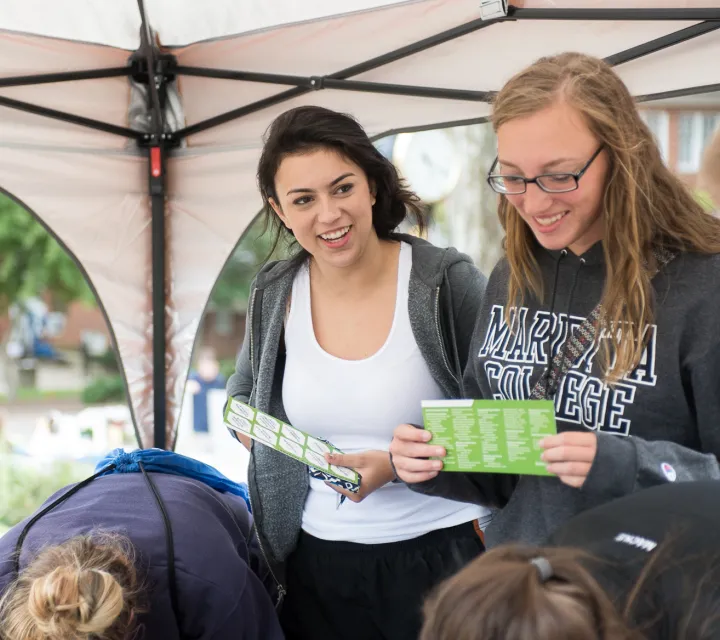At Marietta College, all students work in and outside the classroom to develop key intellectual skills and essential personal/social responsibilities. These important areas of focus are referred to as Institutional Student Learning Outcomes (ISLOs). Marietta College's curricular and co-curricular programs are designed to engage students in the following ISLOs repeatedly over time and in increasingly challenging levels:
Artistic Literacy
is the result of exploring the technical and theoretical aspects of the creative process to foster an aesthetic sensibility that leads to critical analysis, evaluation, and engagement with the arts. This exploration includes experience in developing techniques through the progressive application of interpretation or performance skills. Literacy is also the result of developing a basic understanding of the terms and concepts employed in forming critical responses to the arts and integrating analysis with historical and contextual knowledge.
Classes in this category range from Theatre 106: Acting I to Biology 301: Scientific Imaging.
Communication
in both its written and oral forms, involves the development, organization, and expression of ideas. People communicate to inform, persuade, and/or entertain. Communication can involve working with many different technologies and mixing texts, data, and images.
Classes in this category range from POLS 130: Issues in International Politics to COMM 420: Business Communication Seminar.
Critical Thinking
is a disposition of mind characterized by comprehensively exploring issues, ideas, artifacts, and events before accepting or formulating an opinion or conclusion. It involves analyzing and evaluating one's own thought processes, assumptions, and biases, as well as those of others. Critical thinking facilitates effective problem-solving, synthesizing, inference-drawing, judgment-making, and evidence-based reasoning.
Classes in this category range from ENGY 101: Energy Resources and Utilization to SPAN 331: Spanish-American Civilization.
Ethical Reasoning & Responsible Citizenship
is the thoughtful concern about what is right and wrong and is the attempt to make a positive impact upon one's community - locally, nationally, and/or globally. The practice of ethical and responsible citizenship arises when individuals confront challenges, choices, and ethical dilemmas requiring value judgments. This practice requires skill in assessing and articulating various ethical positions, analyzing the social contexts of problems, and considering the ramifications of various courses of action for oneself and the community.
Classes in this multi-faceted category include PHIL 120: Moral Philosophy, CHEM 420: Biochemistry, HIST 202: Professional Historian, and SMGT 336: Sports Marketing.
Inquiry
is the systematic process of asking questions about and examining issues, objects, data or works through the collection and analysis of evidence and observations as a basis to make informed conclusions.
Classes in this category range from ASTR 205: Life in the Universe to PSYC 380: Psychology of Good and Evil.
Integrative Learning
is an understanding and a disposition that students build across the curriculum and co-curriculum, from making simple connections among ideas and experiences to synthesizing and transferring learning to new, complex situations within and beyond the campus.
Classes in this category range from MASS 230: Introduction to Public Relations to ENVR 330: Environmental Sustainability.
Knowledge of Diversity
involves understanding one's own and others' group identities, critically analyzing systems that shape human relationships, and engaging productively with individuals and groups representing diverse backgrounds and abilities.
Classes from this category range from ARTH 251: Survey of Asian Art to ECON 325: Economics of Gender.
Quantitative Reasoning
is a skill set that empowers individuals to work comfortably with numerical data. When encountering quantitative problems, it is essential to be able to understand the relevant assumptions, limitations, and calculations, and be able to use these to make decisions, evaluate alternative points of view, and communicate key results in appropriate formats. These skills also include the ability to create and comprehend quantitative arguments, including graphs, tables, and equations offered to support conclusions.
Classes in this category range from CSCI 210: Scientific Computing and Problem Solving to LING 320: Introduction to Linguistics.
Marietta College's ISLOs have been adopted and localized from the Association of American Colleges & Universities' VALUE rubrics (Valid Assessment of Learning in Undergraduate Education). Learn more about the AAC&U's VALUE rubrics, part of their LEAP initiative, at http://www.aacu.org/value.
